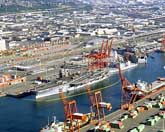Cargo from Asia to the Mediterranean rose 10 percent in April, jumping from a monthly average of 366,000 20-foot-equivalent units in the first quarter of 2013 to 401,000 TEUs, according to Drewry Maritime Research’s latest edition of Container Insight Weekly.
The report said that the rise in April was “evenly split” between the western Mediterranean and North Africa region and the eastern Mediterranean and Black Sea area, suggesting the gain might only be seasonal. The report also suggested that given the “industrial and political unrest seething in the region,” namely Turkey, importers might have decided to get their merchandise in ahead of the peak season as a precaution.
As a result, ocean carriers left their schedules mostly untouched, with only three sailings cancelled in April, compared with seven cancelled in March and seven cancelled in May, according to the report. The outcome was a 2.9 percent increase in westbound vessel capacity between March and April, reaching 461,995 TEUs, followed by a 1.6 decrease in May, back to 454,774 TEUs.
The “uncharacteristic” scheduling inactivity might have been affected by the news that Maersk Line, Mediterranean Shipping Co. and CMA CGM have planned a long-term alliance, the P3 Network, on the major east-west trades, including five Asia-Mediterranean strings, the analysis said.
The consequence of the inactivity in schedule changes and a 10 percent month-to-month increase in cargo in April resulted in the average utilization of all vessels sailing from Asia to the Mediterranean rising from a “poor” 81 percent in March to 87 percent in April, which was not enough to stop freight rates from continuing to plummet, according to the study.
The Journal of Commerce













